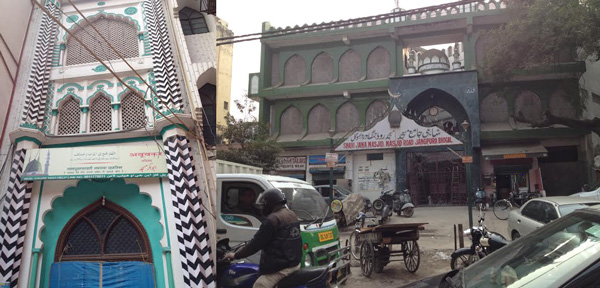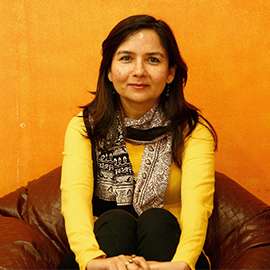Faith, forestalled: a Muslim woman is stymied when she seeks space to pray

"When women ask permission for going to the mosque, do not prevent them: Prophet Mohammed, PBUH."(Muslim, Book 4, Hadith 884)
Fourteen hundred years later, most Muslim women believe we are not allowed to offer namaz in mosques.
I was one of them, too. Till I decided to read up hadiths (sayings of Prophet Mohammed, PBUH) and found at least half-a-dozen references of women offering namaz in mosques during the Prophet's time.
Also read - Why is Islam's poster boy Zakir Naik taking moderate Muslims back in time?
And now that I had rid myself of the misplaced belief that women aren't allowed to pray in mosques, I decided to go to a couple of Delhi mosques to see if I am welcome to join the prayers in any.
My first stop was a mosque in Zakir Nagar - the Abu Bakr Masjid. It is the oldest in the area with a tiny entrance and a zig-zag layout. I was there for the Zohr namaz (afternoon prayer), but it was impossible to get in while the jamaat was in motion.
I waited for the namaz to be over. And then the men to troop out.
I knocked, readjusting the stole with which I had duly covered my head.
A class was in progress in the main hall of the mosque. All eyes were on me, but no-one responded. I waited for a while, then requested a man who was seeking alms outside to go in and ask the Imam sahab if I could offer namaz. A few minutes later, I was told I could.
I tiptoed in, not wanting to distract anyone with my presence. I was directed to a prayer mat in a corner. I felt I was under an X-ray. The Maulvi sahab who was teaching the class had stopped talking. And then there was the sound of a huge wooden door - slammed on me.
I hurriedly finished my prayer and stepped out.
I wish I could have spent more time in the mosque. Sat there and read the Quran Sharif. But this was a man's territory and I had outstayed my welcome.
As I stepped out and spotted over a dozen headscarf-wearing girls from Jamia Millia Islamia University, I wondered, "Where do they go to pray?"
Also read - First person: It is not easy to be a Muslim. I never seem to make the cut
My next stop was the Shahi Jama Masjid in Jangpura. I must admit the sight of several men at the entrance unnerved me a little. I asked one of them if I could offer my Asr prayer. He pointed towards a corner.
It was obvious I wasn't an equal and would not be allowed to pray with the jamaat. I was expected to disappear from sight.
This rambling mosque is undergoing renovation. I wondered why they couldn't reserve a floor or even just a room for women.
It was heartbreaking to seek permission to go into mosque after mosque. Permission to go into the house of God. It was the same story everywhere. Seek permission. Wait for the verdict. Awkward stares. Stony silence. Doors shut.
By the (rule)book

Left: Jamia Mosque; right: Jangpura Mosque. Photos: Lamat R Hasan
During the Prophet's time a man was reprimanded for not allowing his wife to go to the mosque.
"Bilal b. 'Abdullah said: By Allah, we shall certainly prevent them. On this 'Abdullah b. Umar turned towards him and reprimanded him harshly as I had never heard him do before. He ('Abdullah b. Umar) said: I am narrating to you that which comes from the Messenger of Allah (may peace be upon him) and you (have the audacity) to say: By Allah, we shall certainly prevent them." (Muslim, Book 4, Hadith 885)
In fact, the Prophet (PBUH) allowed women to pray in mosques at night, too.
"The Prophet (PBUH) said, 'Allow women to go to the mosques at night'." (Bukhari, Book 2, Volume 13, Hadith 22)
There was opposition to that move, soon after the Prophet's time.
"Ibn 'Umar reported: Grant permission to women for going to the mosque in the night. His son who was called Waqid said: Then they would make mischief. He (the narrator) said: He thumped his (son's) chest and said: I am narrating to you the hadith of the Messenger of Allah (may peace be upon him), and you say: No!" (Muslim, Book 4, Hadith 890)
Rules, bent and broken
Little surprise then that the message that has percolated down the centuries is that women should stay away from mosques. Because they will distract the faithful men who are there to pray.
Addressing or redressing the problem of men being unable to exercise self-control is out of question. The easier option - shut women out.
That women also need a place to pray, much like men, five times a day or at least the times they have stepped out of their homes - is something the custodians of Islam turn a blind eye to.
Ironic, because women who seek space for prayer only reinforce the values Islam is built on.
Forget the daily five prayers, there is no place in the cities for women to offer the special Friday prayer. Women often have to miss this most important prayer because there is no place to go to.
Why is it that Muslim men tend to selectively absorb those ways of the Prophet (PBUH) that suit them? To emulate and cite with flourish the Prophet's (PBUH) habit of eating dessert after a meal - yet not to remember or follow more worthwhile ways of the Prophet, such as treating women as equals or encouraging them to gain knowledge?
The word "ilm" or knowledge appears in the Quran at 140 places.
"The Prophet Muhammad (peace be upon him) said: 'The seeking of knowledge is obligatory for every Muslim'." (Al-Tirmidhi)
Why do we never talk about that?
Postscript: February 12, 2016
It's 2.45 pm. I have been longing to offer the Zohr prayer. I do not want to miss it because it is a Friday. I descend to the landing of the second floor of my office building trying to identify a spot to offer namaz. The floor is fairly populated.
I am back at my desk. Mentally scanning the geography of the area for the nth time. Wondering which is the nearest mosque I can head to. There are none.
The only two possibilities are the dargah of Hazrat Nizamuddin Auliya and the Jama Masjid in Old Delhi. Both are miles away and not feasible options.
Prophet Mohammed (PBUH) had worked out the arrangement of men and women praying in mosques down to the rows. "Abu Huraira said: The best rows for men are the first rows, and the worst ones the last ones, and the best rows for women are the last ones and the worst ones for them are the first ones." (Muslim, Book 4, Hadith 881)
Fourteen hundred years later, we demand more publicly than ever that our women be devout, but make no room for them to pray.
More in Catch - Taking the Sharia to court: 2 Muslim women you should know about
Why I never want to marry in a Catholic church
EXCLUSIVE: Inside a Hindutva hostel: how RSS is rewiring the tribal mind







![BJP's Kapil Mishra recreates Shankar Mahadevan’s ‘Breathless’ song to highlight Delhi pollution [WATCH] BJP's Kapil Mishra recreates Shankar Mahadevan’s ‘Breathless’ song to highlight Delhi pollution [WATCH]](https://images.catchnews.com/upload/2022/11/03/kapil-mishra_240884_300x172.png)

![Anupam Kher shares pictures of his toned body on 67th birthday [MUST SEE] Anupam Kher shares pictures of his toned body on 67th birthday [MUST SEE]](https://images.catchnews.com/upload/2022/03/07/Anupam_kher_231145_300x172.jpg)






